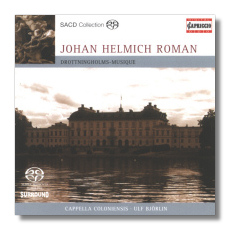
The Internet's Premier Classical Music Source
Related Links
- Roman Reviews
- Latest Reviews
- More Reviews
-
By Composer
-
Collections
DVD & Blu-ray
Books
Concert Reviews
Articles/Interviews
Software
Audio
Search Amazon
Recommended Links
Site News
 CD Review
CD Review
Johan Helmich Roman

Drottningholm-Musik
- Drottningholm-Musik
- Concerto Grosso
Helmut Hucke, oboe
Cappella Coloniensis/Ulf Bjölin
Capriccio 10624 (Cappella Edition) 1992 DDD 48:34
Available on Hybrid Multichannel SACD 71115:
Amazon
- UK
- Germany
- Canada
- France
- Japan
- ArkivMusic
The "father of Swedish music" was himself of Finnish extraction. Johan Helmich Roman (1694-1758) was the son of the Stockholm court's concertmaster and quickly advanced to a position in the orchestra himself before he went to London to study with Ariosti and Pepusch. He later became the head of the court orchestra and created a musical life in the capitol until deafness forced his retirement in 1745. In travels through Europe, he acquired a first-hand knowledge of the era's musical styles, and his own compositions reflect the breadth of his experience. Handel was unquestionably the strongest influence, and Roman's works penetrated from the Baroque into the galant to about the same degree as those of his model: homophonic textures, strong rhythmic verve, and broadly conceived harmonic motion.
In their disc of Roman's works for orchestra, Cappella Edition has offered us a view of two sides of the composer's multifaceted musical nature. The Drottningholms-Musik was written for the summer residence of the royal family. It consists of 40 dance movements, 15 of which are presented here. This suite of sorts is Handelian in every respect (Roman had actually become acquainted with the master). Several movements, in their alternation of strings and winds and the cut of their melodic materials, could, in fact, almost have been written by Handel himself. The concerto grosso (one of only two Roman composed), on the other hand, displays more of the eclectic style for which he is noted.
The Cappella Coloniensis, formed 40 years ago, is one of the oldest period-instrument groups still performing. Their sound is rather fuller and rather sweeter than that of many similar ensembles, and they don't push tempi to the limit. At 40, I suppose, we all mellow. Except for some bad intonation in the horns in the 14th movement of the suite, the performance is characterized by fine ensemble and solo playing (the concerto grosso is virtually an oboe concerto). The ensemble has been active for many years in resurrecting works by relatively unknown composers. If all the debuts are as expert as this one, these composers will make a compelling first impression. The recording is first rate, with special but not undue prominence given to the solo oboe.
Because of the historical position of the composer, this disc will hold special interest for students of Swedish music. Oboists must take special note: the concerto grosso is significant literature. Recommended, despite its stingy timing (nowadays, don't we expect and demand more than 48-odd minutes?).
Copyright © 1996, Robert Maxham
















